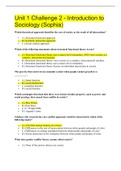Study guide
GDL Contract Law University of Law (Distinction level)
- Course
- Institution
Concise Contract Law study guide/revision notes covering all content you would need to achieve a high Distinction grade; I achieved 83% using these notes. The notes were written using the official ULaw 'points to note' and from workshops/lectures ( materials). They contain all of the important c...
[Show more]












